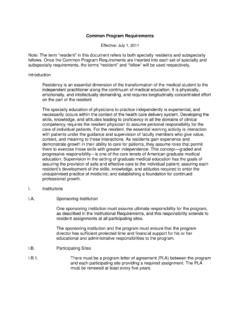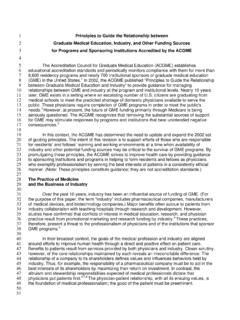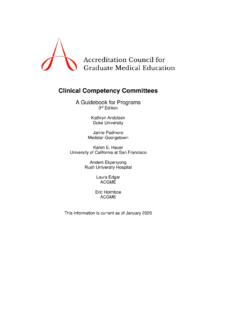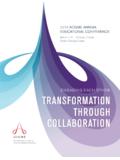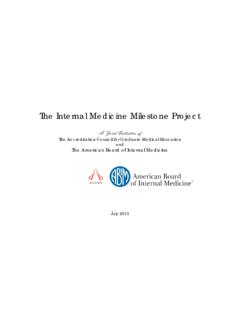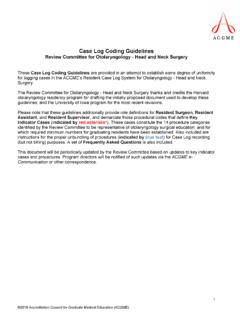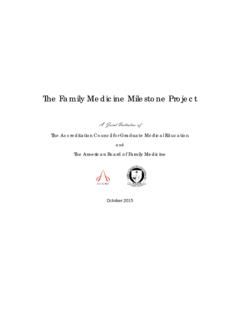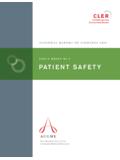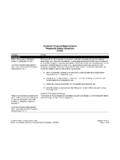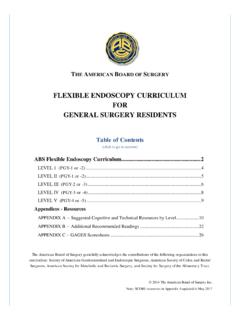Transcription of Common Program Requirements - ACGME Home
1 ACGME Common Program Requirements ACGME approved revisions to Sections I-V: effective 2007, 2013, 2015, 2016 ACGME approved major revision of Section VI: February, 2017; effective: July 1, 2017 Common Program Requirements 2017 accreditation council for graduate medical education ( ACGME ) Page 1 of 27 Common Program Requirements Note: The term resident in this document refers to both specialty residents and subspecialty fellows. Once the Common Program Requirements are inserted into each set of specialty and subspecialty Requirements , the terms resident and fellow will be used respectively. Where applicable, text in italics describes the underlying philosophy of the Requirements in that section.
2 These philosophic statements are not Program Requirements and are therefore not citable. Introduction Residency is an essential dimension of the transformation of the medical student to the independent practitioner along the continuum of medical education . It is physically, emotionally, and intellectually demanding, and requires longitudinally-concentrated effort on the part of the resident. The specialty education of physicians to practice independently is experiential, and necessarily occurs within the context of the health care delivery system. Developing the skills, knowledge, and attitudes leading to proficiency in all the domains of clinical competency requires the resident physician to assume personal responsibility for the care of individual patients.
3 For the resident, the essential learning activity is interaction with patients under the guidance and supervision of faculty members who give value, context, and meaning to those interactions. As residents gain experience and demonstrate growth in their ability to care for patients, they assume roles that permit them to exercise those skills with greater independence. This concept--graded and progressive responsibility--is one of the core tenets of American graduate medical education . Supervision in the setting of graduate medical education has the goals of assuring the provision of safe and effective care to the individual patient; assuring each resident s development of the skills, knowledge, and attitudes required to enter the unsupervised practice of medicine; and establishing a foundation for continued professional growth.
4 I. Institutions Sponsoring Institution One sponsoring institution must assume ultimate responsibility for the Program , as described in the Institutional Requirements , and this responsibility extends to resident assignments at all participating sites. (Core)* The sponsoring institution and the Program must ensure that the Program director has sufficient protected time and financial support for his or her educational and administrative responsibilities to the Program . (Core) Participating Sites There must be a Program letter of agreement (PLA) between the Program and each participating site providing a required assignment. The PLA must be renewed at least every five years. (Core) Common Program Requirements 2017 accreditation council for graduate medical education ( ACGME ) Page 2 of 27 The PLA should: ) identify the faculty who will assume both educational and supervisory responsibilities for residents; (Detail) ) specify their responsibilities for teaching, supervision, and formal evaluation of residents, as specified later in this document; (Detail) ) specify the duration and content of the educational experience; and, (Detail) ) state the policies and procedures that will govern resident education during the assignment.
5 (Detail) The Program director must submit any additions or deletions of participating sites routinely providing an educational experience, required for all residents, of one month full time equivalent (FTE) or more through the accreditation council for graduate medical education ( ACGME ) accreditation Data System (ADS). (Core) [As further specified by the Review Committee] II. Program Personnel and Resources Program Director There must be a single Program director with authority and accountability for the operation of the Program . The sponsoring institution s GMEC must approve a change in Program director. (Core) ) The Program director must submit this change to the ACGME via the ADS. (Core) [As further specified by the Review Committee] The Program director should continue in his or her position for a length of time adequate to maintain continuity of leadership and Program stability.
6 (Detail) Qualifications of the Program director must include: ) requisite specialty expertise and documented educational and administrative experience acceptable to the Review Committee; (Core) ) current certification in the specialty by the American Board of _____, or specialty qualifications that are acceptable to the Review Committee; and, (Core) ) current medical licensure and appropriate medical staff appointment. (Core) Common Program Requirements 2017 accreditation council for graduate medical education ( ACGME ) Page 3 of 27 [As further specified by the Review Committee] The Program director must administer and maintain an educational environment conducive to educating the residents in each of the ACGME competency areas.
7 (Core) The Program director must: ) oversee and ensure the quality of didactic and clinical education in all sites that participate in the Program ; (Core) ) approve a local director at each participating site who is accountable for resident education ; (Core) ) approve the selection of Program faculty as appropriate; (Core) ) evaluate Program faculty; (Core) ) approve the continued participation of Program faculty based on evaluation; (Core) ) monitor resident supervision at all participating sites; (Core) ) prepare and submit all information required and requested by the ACGME . (Core) ).(1) This includes but is not limited to the Program application forms and annual Program updates to the ADS, and ensure that the information submitted is accurate and complete.
8 (Core) ) ensure compliance with grievance and due process procedures as set forth in the Institutional Requirements and implemented by the sponsoring institution; (Detail) ) provide verification of residency education for all residents, including those who leave the Program prior to completion; (Detail) ) implement policies and procedures consistent with the institutional and Program Requirements for resident duty hours and the working environment, including moonlighting, (Core) and, to that end, must: ).(1) distribute these policies and procedures to the residents and faculty; (Detail) ).(2) monitor resident duty hours, according to sponsoring institutional policies, with a frequency sufficient to ensure compliance with ACGME Requirements ; (Core) ).
9 (3) adjust schedules as necessary to mitigate excessive Common Program Requirements 2017 accreditation council for graduate medical education ( ACGME ) Page 4 of 27 service demands and/or fatigue; and, (Detail) ).(4) if applicable, monitor the demands of at-home call and adjust schedules as necessary to mitigate excessive service demands and/or fatigue. (Detail) ) monitor the need for and ensure the provision of back up support systems when patient care responsibilities are unusually difficult or prolonged; (Detail) ) comply with the sponsoring institution s written policies and procedures, including those specified in the Institutional Requirements , for selection, evaluation and promotion of residents, disciplinary action, and supervision of residents; (Detail) ) be familiar with and comply with ACGME and Review Committee policies and procedures as outlined in the ACGME Manual of Policies and Procedures.
10 (Detail) ) obtain review and approval of the sponsoring institution s GMEC/DIO before submitting information or requests to the ACGME , including: (Core) ).(1) all applications for ACGME accreditation of new programs ; (Detail) ).(2) changes in resident complement; (Detail) ).(3) major changes in Program structure or length of training; (Detail) ).(4) progress reports requested by the Review Committee; (Detail) ).(5) requests for increases or any change to resident duty hours; (Detail) ).(6) voluntary withdrawals of ACGME -accredited programs ; (Detail) ).(7) requests for appeal of an adverse action; and, (Detail) ).(8) appeal presentations to a Board of Appeal or the ACGME . (Detail) ) obtain DIO review and co-signature on all Program application forms, as well as any correspondence or document submitted to the ACGME that addresses: (Detail) ).
